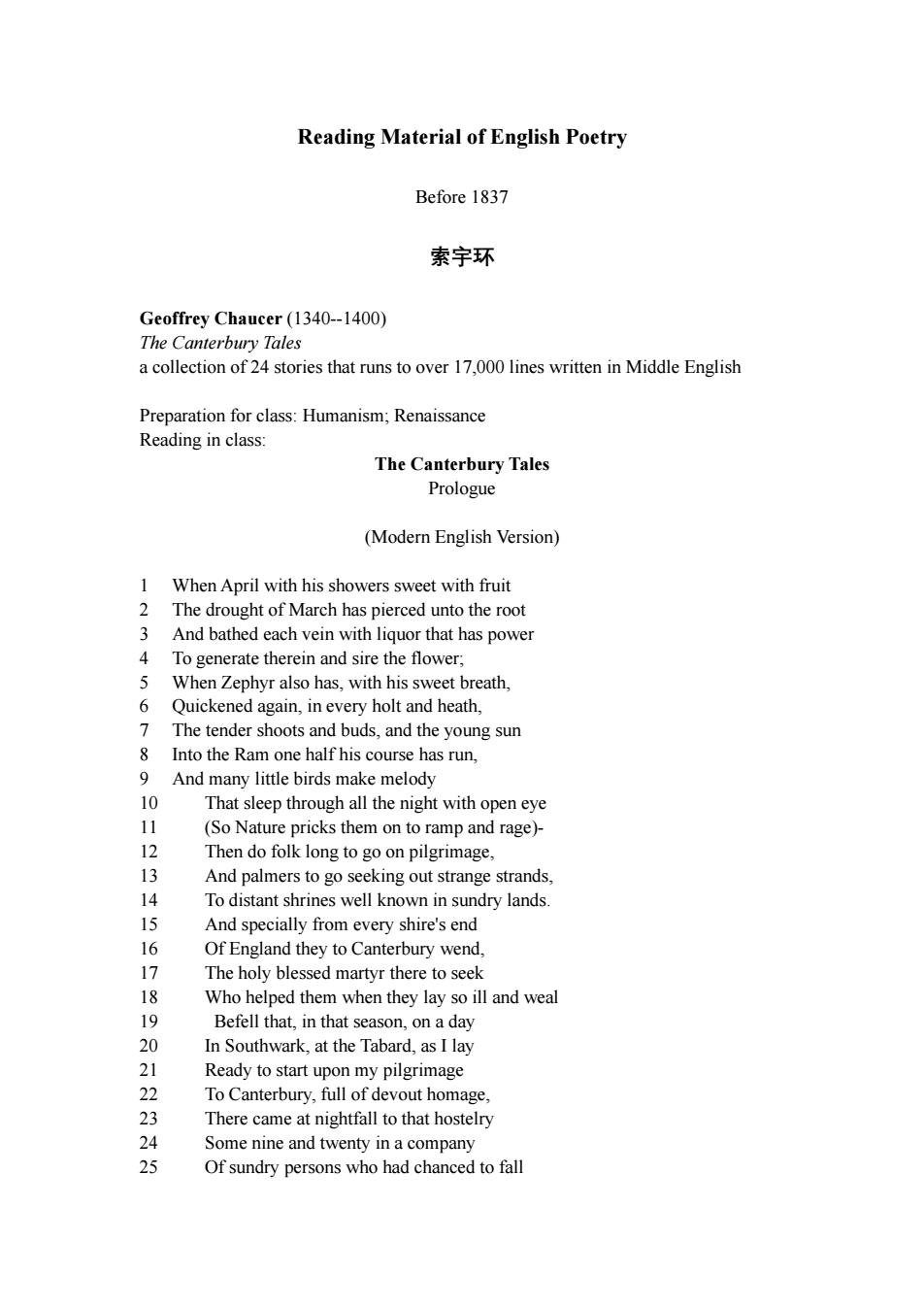
Reading Material of English Poetry Before 1837 索宇环 Geoffrey Chaucer (1340--1400) The Canterbury Tales a collection of 24 stories that runs to over 17,000 lines written in Middle English Preparation for class:Humanism;Renaissance Reading in class: The Canterbury Tales Prologue (Modern English Version) 1 When April with his showers sweet with fruit 2 The drought of March has pierced unto the root 3 And bathed each vein with liquor that has power 4 To generate therein and sire the flower; 5 When Zephyr also has,with his sweet breath, 6 Quickened again,in every holt and heath, 7 The tender shoots and buds,and the young sun 8 Into the Ram one half his course has run, 9 And many little birds make melody 10 That sleep through all the night with open eye 11 (So Nature pricks them on to ramp and rage)- 12 Then do folk long to go on pilgrimage, 13 And palmers to go seeking out strange strands, 14 To distant shrines well known in sundry lands. 15 And specially from every shire's end 16 Of England they to Canterbury wend, 17 The holy blessed martyr there to seek 18 Who helped them when they lay so ill and weal 19 Befell that,in that season,on a day 20 In Southwark,at the Tabard,as I lay 21 Ready to start upon my pilgrimage 22 To Canterbury,full of devout homage, 23 There came at nightfall to that hostelry 24 Some nine and twenty in a company 25 Of sundry persons who had chanced to fall
Reading Material of English Poetry Before 1837 索宇环 Geoffrey Chaucer (1340--1400) The Canterbury Tales a collection of 24 stories that runs to over 17,000 lines written in Middle English Preparation for class: Humanism; Renaissance Reading in class: The Canterbury Tales Prologue (Modern English Version) 1 When April with his showers sweet with fruit 2 The drought of March has pierced unto the root 3 And bathed each vein with liquor that has power 4 To generate therein and sire the flower; 5 When Zephyr also has, with his sweet breath, 6 Quickened again, in every holt and heath, 7 The tender shoots and buds, and the young sun 8 Into the Ram one half his course has run, 9 And many little birds make melody 10 That sleep through all the night with open eye 11 (So Nature pricks them on to ramp and rage)- 12 Then do folk long to go on pilgrimage, 13 And palmers to go seeking out strange strands, 14 To distant shrines well known in sundry lands. 15 And specially from every shire's end 16 Of England they to Canterbury wend, 17 The holy blessed martyr there to seek 18 Who helped them when they lay so ill and weal 19 Befell that, in that season, on a day 20 In Southwark, at the Tabard, as I lay 21 Ready to start upon my pilgrimage 22 To Canterbury, full of devout homage, 23 There came at nightfall to that hostelry 24 Some nine and twenty in a company 25 Of sundry persons who had chanced to fall
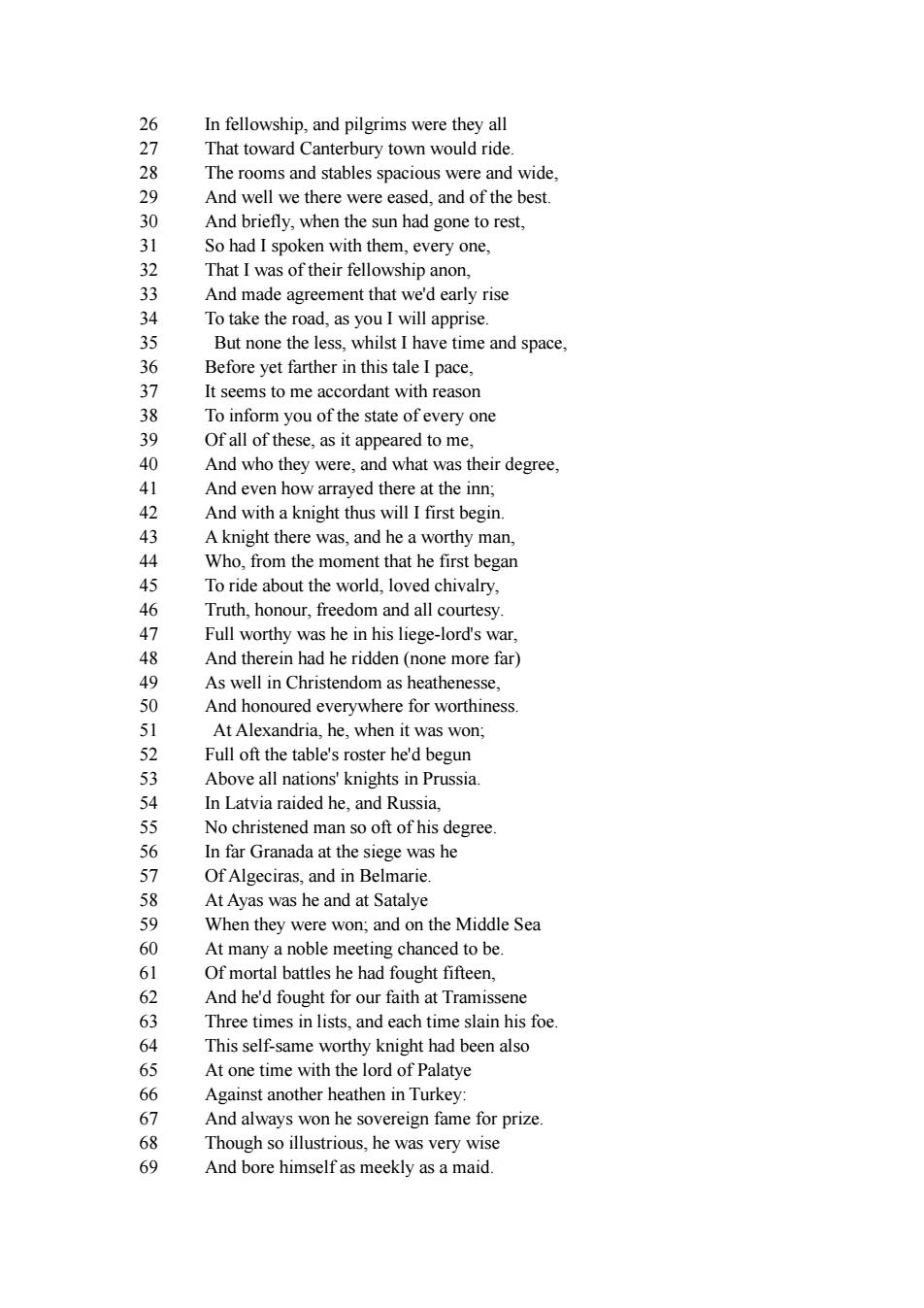
26 In fellowship,and pilgrims were they all 27 That toward Canterbury town would ride 28 The rooms and stables spacious were and wide, 29 And well we there were eased.and of the best 30 And briefly,when the sun had gone to rest, 31 So had I spoken with them,every one 32 That I was of their fellowship anon, 33 And made agreement that we'd early rise 34 To take the road,as you I will apprise. 35 But none the less,whilst I have time and space, 36 Before yet farther in this tale I pace, 37 It seems to me accordant with reason 38 To inform you of the state of every one 39 Of all of these,as it appeared to me, 40 And who they were,and what was their degree, 41 And even how arrayed there at the inn; 42 And with a knight thus will I first begin 43 A knight there was,and he a worthy man, 44 Who,from the moment that he first began 45 To ride about the world,loved chivalry, 46 Truth,honour,freedom and all courtesy. 47 Full worthy was he in his liege-lord's war, 48 And therein had he ridden(none more far) 49 As well in Christendom as heathenesse, 50 And honoured everywhere for worthiness. 51 At Alexandria,he,when it was won; 52 Full oft the table's roster he'd begun 53 Above all nations'knights in Prussia. 54 In Latvia raided he,and Russia, 55 No christened man so oft of his degree. 56 In far Granada at the siege was he 57 Of Algeciras,and in Belmarie. 58 At Ayas was he and at Satalye 59 When they were won;and on the Middle Sea 60 At many a noble meeting chanced to be 61 Of mortal battles he had fought fifteen, 62 And he'd fought for our faith at Tramissene 63 Three times in lists,and each time slain his foe. 64 This self-same worthy knight had been also 65 At one time with the lord of Palatye 66 Against another heathen in Turkey: 67 And always won he sovereign fame for prize 68 Though so illustrious,he was very wise 69 And bore himself as meekly as a maid
26 In fellowship, and pilgrims were they all 27 That toward Canterbury town would ride. 28 The rooms and stables spacious were and wide, 29 And well we there were eased, and of the best. 30 And briefly, when the sun had gone to rest, 31 So had I spoken with them, every one, 32 That I was of their fellowship anon, 33 And made agreement that we'd early rise 34 To take the road, as you I will apprise. 35 But none the less, whilst I have time and space, 36 Before yet farther in this tale I pace, 37 It seems to me accordant with reason 38 To inform you of the state of every one 39 Of all of these, as it appeared to me, 40 And who they were, and what was their degree, 41 And even how arrayed there at the inn; 42 And with a knight thus will I first begin. 43 A knight there was, and he a worthy man, 44 Who, from the moment that he first began 45 To ride about the world, loved chivalry, 46 Truth, honour, freedom and all courtesy. 47 Full worthy was he in his liege-lord's war, 48 And therein had he ridden (none more far) 49 As well in Christendom as heathenesse, 50 And honoured everywhere for worthiness. 51 At Alexandria, he, when it was won; 52 Full oft the table's roster he'd begun 53 Above all nations' knights in Prussia. 54 In Latvia raided he, and Russia, 55 No christened man so oft of his degree. 56 In far Granada at the siege was he 57 Of Algeciras, and in Belmarie. 58 At Ayas was he and at Satalye 59 When they were won; and on the Middle Sea 60 At many a noble meeting chanced to be. 61 Of mortal battles he had fought fifteen, 62 And he'd fought for our faith at Tramissene 63 Three times in lists, and each time slain his foe. 64 This self-same worthy knight had been also 65 At one time with the lord of Palatye 66 Against another heathen in Turkey: 67 And always won he sovereign fame for prize. 68 Though so illustrious, he was very wise 69 And bore himself as meekly as a maid

70 He never yet had any vileness said, 71 In all his life,to whatsoever wight. 72 He was a truly perfect,gentle knight 73 But now,to tell you all of his array, 74 His steeds were good,but yet he was not gay. 75 Of simple fustian wore he a jupon 76 Sadly discoloured by his habergeon; 77 For he had lately come from his voyage 78 And now was going on this pilgrimage 79 With him there was his son,a youthful squire, 80 A lover and a lusty bachelor, 81 With locks well curled,as if they'd laid in press. 82 Some twenty years of age he was,I guess. 83 In stature he was of an average length, 84 Wondrously active,aye,and great of strength. 85 He'd ridden sometime with the cavalry 86 In Flanders.in Artois.and Picardy. 87 And borne him well within that little space 88 In hope to win thereby his lady's grace. 89 Prinked out he was,as if he were a mead, 90 All full of fresh-cut flowers white and red 91 Singing he was,or fluting,all the day; 92 He was as fresh as is the month of May. 93 Short was his gown,with sleeves both long and wide. 94 Well could be sit on horse,and fairly ride 95 He could make songs and words thereto indite, 96 Joust,and dance too,as well as sketch and write. 97 So hot he loved that,while night told her tale, 98 He slept no more than does a nightingale. 99 Courteous he,and humble,willing and able, 100 And carved before his father at the table. 101 A yeoman had he,nor more servants,no, 102 At that time,for he chose to travel so; 103 And he was clad in coat and hood of green. 104 A sheaf of peacock arrows bright and keen 105 Under his belt he bore right carefully 106 (Well could he keep his tackle yeomanly: 107 His arrows had no draggled feathers low), 108 And in his hand he bore a mighty bow. 109 A cropped head had he and a sun-browned face 110 Of woodcraft knew he all the useful ways. 111 Upon his arm he bore a bracer gay, 112 And at one side a sword and buckler,yea, 113 And at the other side a dagger bright
70 He never yet had any vileness said, 71 In all his life, to whatsoever wight. 72 He was a truly perfect, gentle knight. 73 But now, to tell you all of his array, 74 His steeds were good, but yet he was not gay. 75 Of simple fustian wore he a jupon 76 Sadly discoloured by his habergeon; 77 For he had lately come from his voyage 78 And now was going on this pilgrimage. 79 With him there was his son, a youthful squire, 80 A lover and a lusty bachelor, 81 With locks well curled, as if they'd laid in press. 82 Some twenty years of age he was, I guess. 83 In stature he was of an average length, 84 Wondrously active, aye, and great of strength. 85 He'd ridden sometime with the cavalry 86 In Flanders, in Artois, and Picardy, 87 And borne him well within that little space 88 In hope to win thereby his lady's grace. 89 Prinked out he was, as if he were a mead, 90 All full of fresh-cut flowers white and red. 91 Singing he was, or fluting, all the day; 92 He was as fresh as is the month of May. 93 Short was his gown, with sleeves both long and wide. 94 Well could be sit on horse, and fairly ride. 95 He could make songs and words thereto indite, 96 Joust, and dance too, as well as sketch and write. 97 So hot he loved that, while night told her tale, 98 He slept no more than does a nightingale. 99 Courteous he, and humble, willing and able, 100 And carved before his father at the table. 101 A yeoman had he, nor more servants, no, 102 At that time, for he chose to travel so; 103 And he was clad in coat and hood of green. 104 A sheaf of peacock arrows bright and keen 105 Under his belt he bore right carefully 106 (Well could he keep his tackle yeomanly: 107 His arrows had no draggled feathers low), 108 And in his hand he bore a mighty bow. 109 A cropped head had he and a sun-browned face. 110 Of woodcraft knew he all the useful ways. 111 Upon his arm he bore a bracer gay, 112 And at one side a sword and buckler, yea, 113 And at the other side a dagger bright

114 Well sheathed and sharp as spear point in the light; 115 On breast a Christopher of silver sheen. 116 He bore a horn in baldric all of green; 117 A forester he truly was,I guess. 118 There was also a nun,a prioress, 119 Who,in her smiling,modest was and coy; 120 Her greatest oath was but By Saint Eloy! 121 And she was known as Madam Eglantine. 122 Full well she sang the services divine, 123 Intoning through her nose,becomingly; 124 And fair she spoke her French,and fluently, 125 After the school of Stratford-at-the-Bow, 126 For French of Paris was not hers to know. 127 At table she had been well taught withal, 128 And never from her lips let morsels fall, 129 Nor dipped her fingers deep in sauce,but ate 130 With so much care the food upon her plate 131 That never driblet fell upon her breast. 132 In courtesy she had delight and zest. 133 Her upper lip was always wiped so clean 134 That in her cup was no iota seen 135 Of grease,when she had drunk her draught of wine 136 Becomingly she reached for meat to dine. 137 And certainly delighting in good sport, 138 She was right pleasant,amiable-in short. 139 She was at pains to counterfeit the look 140 Of courtliness,and stately manners took, 141 And would be held worthy of reverence. 142 But,to say something of her moral sense, 143 She was so charitable and piteous 144 That she would weep if she but saw a mouse 145 Caught in a trap,though it were dead or bled. 146 She had some little dogs,too,that she fed 147 On roasted flesh,or milk and fine white bread. 148 But sore she'd weep if one of them were dead, 149 Or if men smote it with a rod to smart: 150 For pity ruled her,and her tender heart 151 Right decorous her pleated wimple was; 152 Her nose was fine;her eyes were blue as glass; 153 Her mouth was small and therewith soft and red; 154 But certainly she had a fair forehead; 155 It was almost a full span broad,I own
114 Well sheathed and sharp as spear point in the light; 115 On breast a Christopher of silver sheen. 116 He bore a horn in baldric all of green; 117 A forester he truly was, I guess. 118 There was also a nun, a prioress, 119 Who, in her smiling, modest was and coy; 120 Her greatest oath was but By Saint Eloy! 121 And she was known as Madam Eglantine. 122 Full well she sang the services divine, 123 Intoning through her nose, becomingly; 124 And fair she spoke her French, and fluently, 125 After the school of Stratford-at-the-Bow, 126 For French of Paris was not hers to know. 127 At table she had been well taught withal, 128 And never from her lips let morsels fall, 129 Nor dipped her fingers deep in sauce, but ate 130 With so much care the food upon her plate 131 That never driblet fell upon her breast. 132 In courtesy she had delight and zest. 133 Her upper lip was always wiped so clean 134 That in her cup was no iota seen 135 Of grease, when she had drunk her draught of wine. 136 Becomingly she reached for meat to dine. 137 And certainly delighting in good sport, 138 She was right pleasant, amiable- in short. 139 She was at pains to counterfeit the look 140 Of courtliness, and stately manners took, 141 And would be held worthy of reverence. 142 But, to say something of her moral sense, 143 She was so charitable and piteous 144 That she would weep if she but saw a mouse 145 Caught in a trap, though it were dead or bled. 146 She had some little dogs, too, that she fed 147 On roasted flesh, or milk and fine white bread. 148 But sore she'd weep if one of them were dead, 149 Or if men smote it with a rod to smart: 150 For pity ruled her, and her tender heart. 151 Right decorous her pleated wimple was; 152 Her nose was fine; her eyes were blue as glass; 153 Her mouth was small and therewith soft and red; 154 But certainly she had a fair forehead; 155 It was almost a full span broad, I own
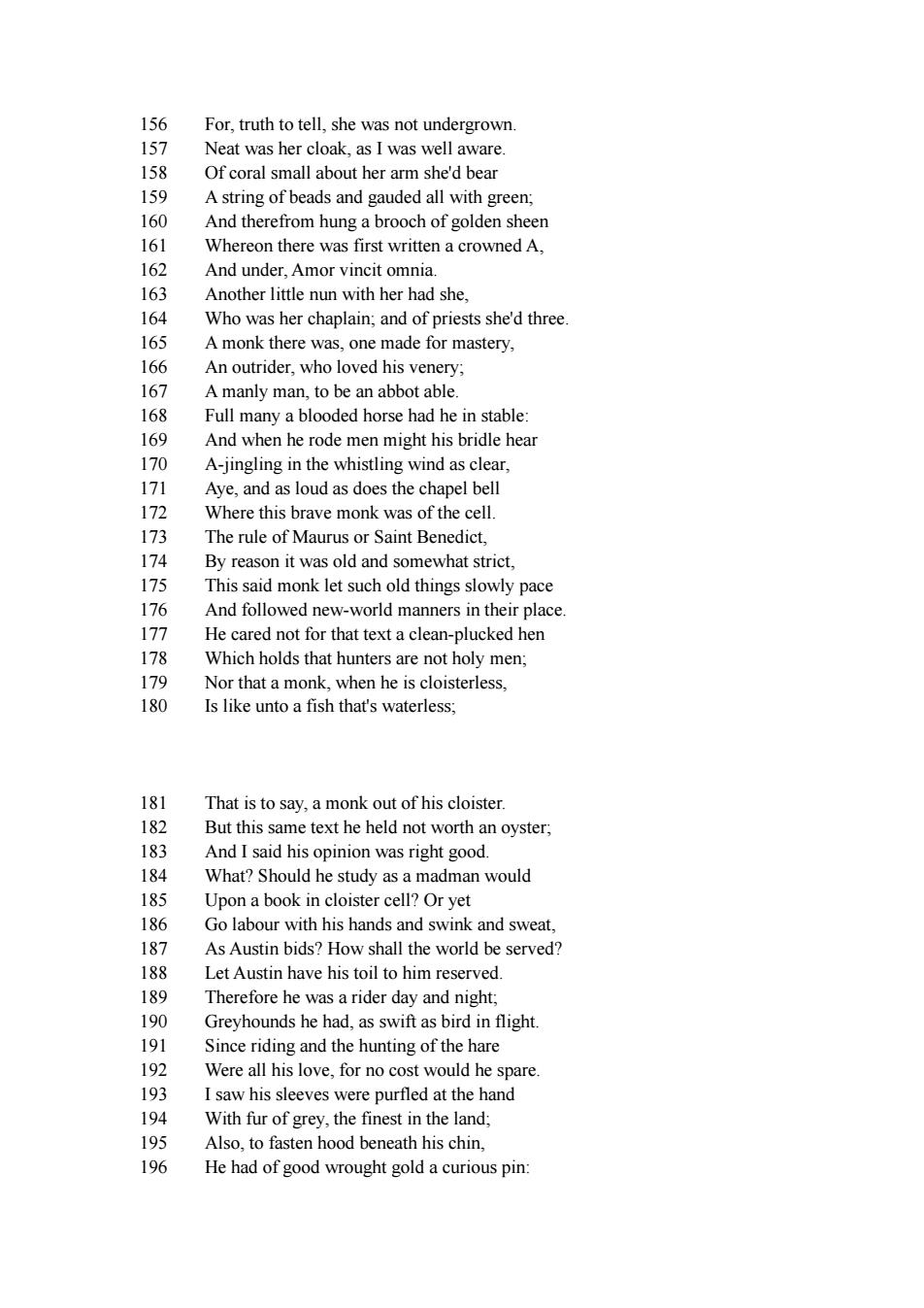
156 For,truth to tell,she was not undergrown. 157 Neat was her cloak,as I was well aware. 158 Of coral small about her arm she'd bear 159 A string of beads and gauded all with green; 160 And therefrom hung a brooch of golden sheen 161 Whereon there was first written a crowned A. 162 And under,Amor vincit omnia. 163 Another little nun with her had she, 164 Who was her chaplain;and of priests she'd three. 165 A monk there was,one made for mastery, 166 An outrider,who loved his venery; 167 A manly man,to be an abbot able 168 Full many a blooded horse had he in stable: 169 And when he rode men might his bridle hear 170 A-jingling in the whistling wind as clear, 171 Aye,and as loud as does the chapel bell 172 Where this brave monk was of the cell 173 The rule of Maurus or Saint Benedict, 174 By reason it was old and somewhat strict, 175 This said monk let such old things slowly pace 176 And followed new-world manners in their place. 177 He cared not for that text a clean-plucked hen 178 Which holds that hunters are not holy men; 179 Nor that a monk,when he is cloisterless, 180 Is like unto a fish that's waterless; 181 That is to say,a monk out of his cloister. 182 But this same text he held not worth an oyster; 183 And I said his opinion was right good. 184 What?Should he study as a madman would 185 Upon a book in cloister cell?Or yet 186 Go labour with his hands and swink and sweat, 187 As Austin bids?How shall the world be served? 188 Let Austin have his toil to him reserved 189 Therefore he was a rider day and night; 190 Greyhounds he had,as swift as bird in flight. 191 Since riding and the hunting of the hare 192 Were all his love,for no cost would he spare. 193 I saw his sleeves were purfled at the hand 194 With fur of grey,the finest in the land; 195 Also,to fasten hood beneath his chin, 196 He had of good wrought gold a curious pin:
156 For, truth to tell, she was not undergrown. 157 Neat was her cloak, as I was well aware. 158 Of coral small about her arm she'd bear 159 A string of beads and gauded all with green; 160 And therefrom hung a brooch of golden sheen 161 Whereon there was first written a crowned A, 162 And under, Amor vincit omnia. 163 Another little nun with her had she, 164 Who was her chaplain; and of priests she'd three. 165 A monk there was, one made for mastery, 166 An outrider, who loved his venery; 167 A manly man, to be an abbot able. 168 Full many a blooded horse had he in stable: 169 And when he rode men might his bridle hear 170 A-jingling in the whistling wind as clear, 171 Aye, and as loud as does the chapel bell 172 Where this brave monk was of the cell. 173 The rule of Maurus or Saint Benedict, 174 By reason it was old and somewhat strict, 175 This said monk let such old things slowly pace 176 And followed new-world manners in their place. 177 He cared not for that text a clean-plucked hen 178 Which holds that hunters are not holy men; 179 Nor that a monk, when he is cloisterless, 180 Is like unto a fish that's waterless; 181 That is to say, a monk out of his cloister. 182 But this same text he held not worth an oyster; 183 And I said his opinion was right good. 184 What? Should he study as a madman would 185 Upon a book in cloister cell? Or yet 186 Go labour with his hands and swink and sweat, 187 As Austin bids? How shall the world be served? 188 Let Austin have his toil to him reserved. 189 Therefore he was a rider day and night; 190 Greyhounds he had, as swift as bird in flight. 191 Since riding and the hunting of the hare 192 Were all his love, for no cost would he spare. 193 I saw his sleeves were purfled at the hand 194 With fur of grey, the finest in the land; 195 Also, to fasten hood beneath his chin, 196 He had of good wrought gold a curious pin:
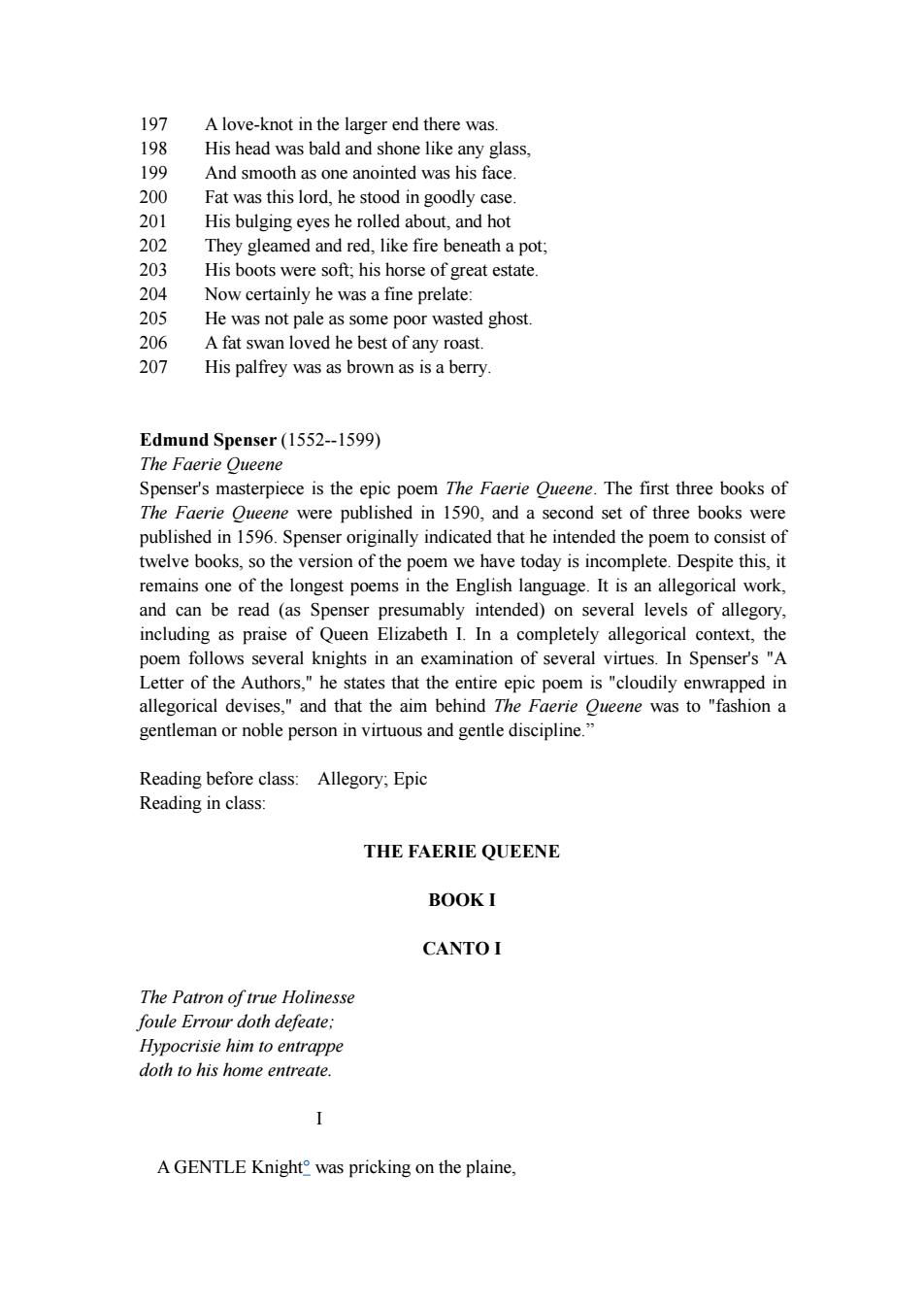
197 A love-knot in the larger end there was. 198 His head was bald and shone like any glass, 199 And smooth as one anointed was his face. 200 Fat was this lord,he stood in goodly case 201 His bulging eyes he rolled about,and hot 202 They gleamed and red,like fire beneath a pot; 203 His boots were soft;his horse of great estate. 204 Now certainly he was a fine prelate: 205 He was not pale as some poor wasted ghost 206 A fat swan loved he best of any roast. 207 His palfrey was as brown as is a berry. Edmund Spenser (1552--1599) The Faerie Queene Spenser's masterpiece is the epic poem The Faerie Queene.The first three books of The Faerie Oueene were published in 1590,and a second set of three books were published in 1596.Spenser originally indicated that he intended the poem to consist of twelve books,so the version of the poem we have today is incomplete.Despite this,it remains one of the longest poems in the English language.It is an allegorical work, and can be read (as Spenser presumably intended)on several levels of allegory, including as praise of Queen Elizabeth I.In a completely allegorical context,the poem follows several knights in an examination of several virtues.In Spenser's "A Letter of the Authors,"he states that the entire epic poem is "cloudily enwrapped in allegorical devises,"and that the aim behind The Faerie Queene was to "fashion a gentleman or noble person in virtuous and gentle discipline." Reading before class:Allegory;Epic Reading in class: THE FAERIE QUEENE BOOKI CANTOI The Patron oftrue Holinesse foule Errour doth defeate; Hypocrisie him to entrappe doth to his home entreate. A GENTLE Knighto was pricking on the plaine
197 A love-knot in the larger end there was. 198 His head was bald and shone like any glass, 199 And smooth as one anointed was his face. 200 Fat was this lord, he stood in goodly case. 201 His bulging eyes he rolled about, and hot 202 They gleamed and red, like fire beneath a pot; 203 His boots were soft; his horse of great estate. 204 Now certainly he was a fine prelate: 205 He was not pale as some poor wasted ghost. 206 A fat swan loved he best of any roast. 207 His palfrey was as brown as is a berry. Edmund Spenser (1552--1599) The Faerie Queene Spenser's masterpiece is the epic poem The Faerie Queene. The first three books of The Faerie Queene were published in 1590, and a second set of three books were published in 1596. Spenser originally indicated that he intended the poem to consist of twelve books, so the version of the poem we have today is incomplete. Despite this, it remains one of the longest poems in the English language. It is an allegorical work, and can be read (as Spenser presumably intended) on several levels of allegory, including as praise of Queen Elizabeth I. In a completely allegorical context, the poem follows several knights in an examination of several virtues. In Spenser's "A Letter of the Authors," he states that the entire epic poem is "cloudily enwrapped in allegorical devises," and that the aim behind The Faerie Queene was to "fashion a gentleman or noble person in virtuous and gentle discipline.” Reading before class: Allegory; Epic Reading in class: THE FAERIE QUEENE BOOK I CANTO I The Patron of true Holinesse foule Errour doth defeate; Hypocrisie him to entrappe doth to his home entreate. I A GENTLE Knight° was pricking on the plaine
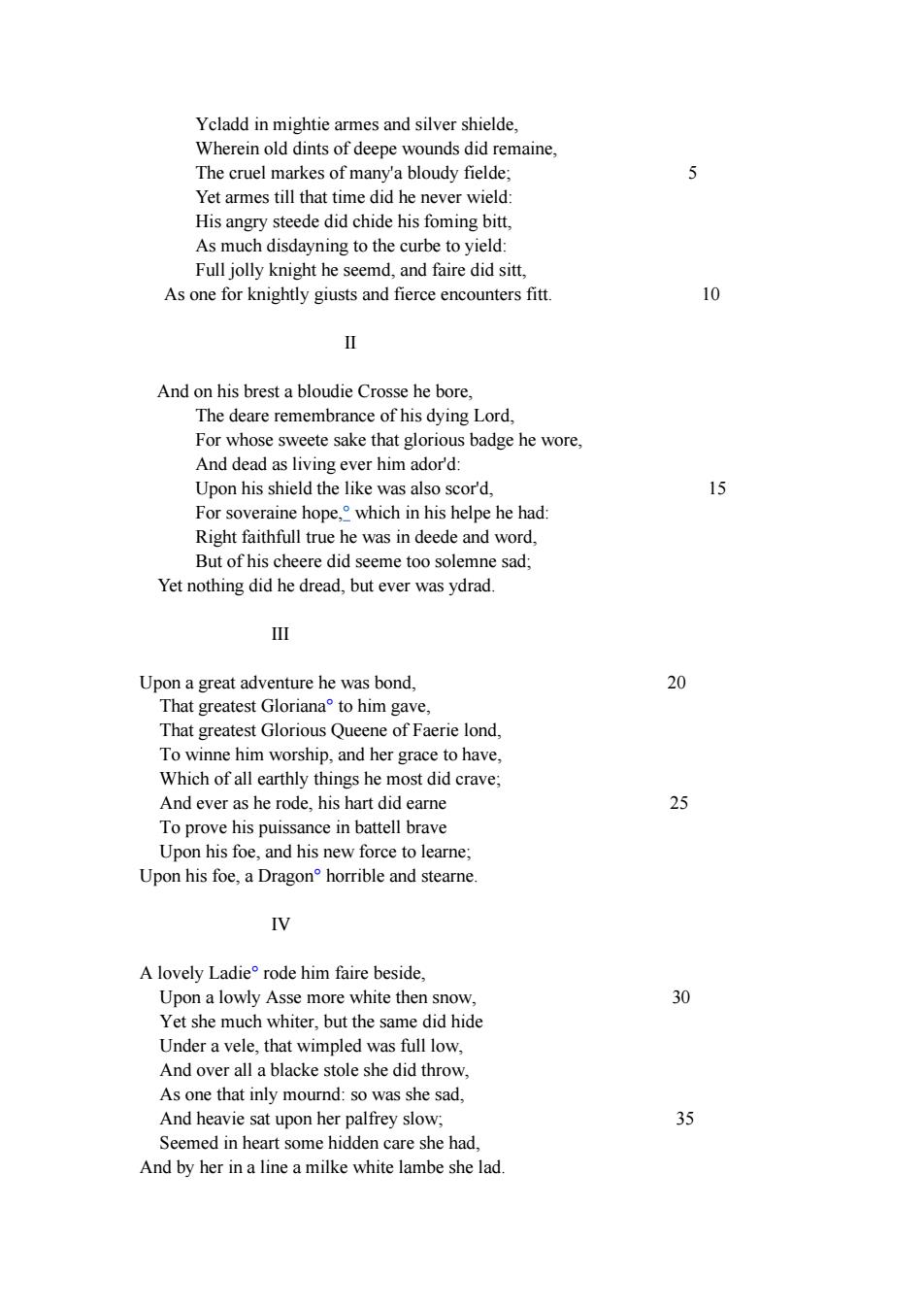
Ycladd in mightie armes and silver shielde, Wherein old dints of deepe wounds did remaine, The cruel markes of many'a bloudy fielde; Yet armes till that time did he never wield: His angry steede did chide his foming bitt, As much disdayning to the curbe to yield: Full jolly knight he seemd,and faire did sitt, As one for knightly giusts and fierce encounters fitt. 10 Ⅱ And on his brest a bloudie Crosse he bore, The deare remembrance of his dying Lord, For whose sweete sake that glorious badge he wore, And dead as living ever him ador'd: Upon his shield the like was also scor'd, 15 For soveraine hope,which in his helpe he had: Right faithfull true he was in deede and word, But of his cheere did seeme too solemne sad; Yet nothing did he dread,but ever was ydrad. Ⅲ Upon a great adventure he was bond, 20 That greatest Gloriana to him gave, That greatest Glorious Queene of Faerie lond, To winne him worship,and her grace to have, Which of all earthly things he most did crave; And ever as he rode,his hart did earne 25 To prove his puissance in battell brave Upon his foe,and his new force to learne; Upon his foe,a Dragon horrible and stearne. IV A lovely Ladie rode him faire beside, Upon a lowly Asse more white then snow, 30 Yet she much whiter,but the same did hide Under a vele,that wimpled was full low, And over all a blacke stole she did throw, As one that inly mournd:so was she sad, And heavie sat upon her palfrey slow; 35 Seemed in heart some hidden care she had, And by her in a line a milke white lambe she lad
Ycladd in mightie armes and silver shielde, Wherein old dints of deepe wounds did remaine, The cruel markes of many'a bloudy fielde; 5 Yet armes till that time did he never wield: His angry steede did chide his foming bitt, As much disdayning to the curbe to yield: Full jolly knight he seemd, and faire did sitt, As one for knightly giusts and fierce encounters fitt. 10 II And on his brest a bloudie Crosse he bore, The deare remembrance of his dying Lord, For whose sweete sake that glorious badge he wore, And dead as living ever him ador'd: Upon his shield the like was also scor'd, 15 For soveraine hope,° which in his helpe he had: Right faithfull true he was in deede and word, But of his cheere did seeme too solemne sad; Yet nothing did he dread, but ever was ydrad. III Upon a great adventure he was bond, 20 That greatest Gloriana° to him gave, That greatest Glorious Queene of Faerie lond, To winne him worship, and her grace to have, Which of all earthly things he most did crave; And ever as he rode, his hart did earne 25 To prove his puissance in battell brave Upon his foe, and his new force to learne; Upon his foe, a Dragon° horrible and stearne. IV A lovely Ladie° rode him faire beside, Upon a lowly Asse more white then snow, 30 Yet she much whiter, but the same did hide Under a vele, that wimpled was full low, And over all a blacke stole she did throw, As one that inly mournd: so was she sad, And heavie sat upon her palfrey slow; 35 Seemed in heart some hidden care she had, And by her in a line a milke white lambe she lad
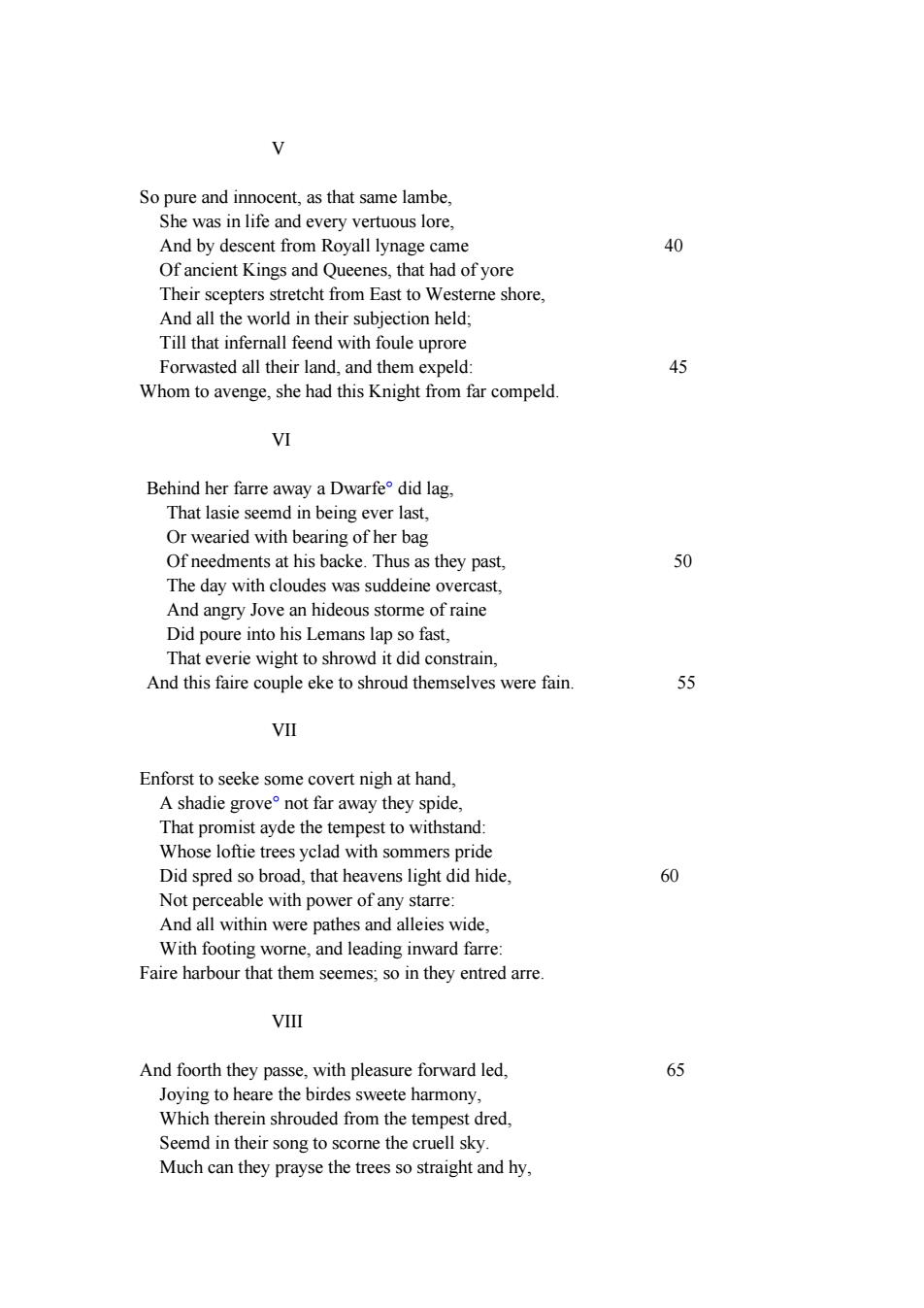
V So pure and innocent,as that same lambe, She was in life and every vertuous lore, And by descent from Royall lynage came 40 Of ancient Kings and Queenes,that had of yore Their scepters stretcht from East to Westerne shore, And all the world in their subjection held; Till that infernall feend with foule uprore Forwasted all their land,and them expeld: 45 Whom to avenge,she had this Knight from far compeld. VI Behind her farre away a Dwarfe did lag, That lasie seemd in being ever last, Or wearied with bearing of her bag Of needments at his backe.Thus as they past, 50 The day with cloudes was suddeine overcast, And angry Jove an hideous storme of raine Did poure into his Lemans lap so fast, That everie wight to shrowd it did constrain, And this faire couple eke to shroud themselves were fain. 55 VII Enforst to seeke some covert nigh at hand, A shadie grove not far away they spide, That promist ayde the tempest to withstand: Whose loftie trees yclad with sommers pride Did spred so broad,that heavens light did hide, 60 Not perceable with power of any starre: And all within were pathes and alleies wide, With footing worne,and leading inward farre: Faire harbour that them seemes;so in they entred arre. VIll And foorth they passe,with pleasure forward led, 65 Joying to heare the birdes sweete harmony, Which therein shrouded from the tempest dred, Seemd in their song to scorne the cruell sky. Much can they prayse the trees so straight and hy
V So pure and innocent, as that same lambe, She was in life and every vertuous lore, And by descent from Royall lynage came 40 Of ancient Kings and Queenes, that had of yore Their scepters stretcht from East to Westerne shore, And all the world in their subjection held; Till that infernall feend with foule uprore Forwasted all their land, and them expeld: 45 Whom to avenge, she had this Knight from far compeld. VI Behind her farre away a Dwarfe° did lag, That lasie seemd in being ever last, Or wearied with bearing of her bag Of needments at his backe. Thus as they past, 50 The day with cloudes was suddeine overcast, And angry Jove an hideous storme of raine Did poure into his Lemans lap so fast, That everie wight to shrowd it did constrain, And this faire couple eke to shroud themselves were fain. 55 VII Enforst to seeke some covert nigh at hand, A shadie grove° not far away they spide, That promist ayde the tempest to withstand: Whose loftie trees yclad with sommers pride Did spred so broad, that heavens light did hide, 60 Not perceable with power of any starre: And all within were pathes and alleies wide, With footing worne, and leading inward farre: Faire harbour that them seemes; so in they entred arre. VIII And foorth they passe, with pleasure forward led, 65 Joying to heare the birdes sweete harmony, Which therein shrouded from the tempest dred, Seemd in their song to scorne the cruell sky. Much can they prayse the trees so straight and hy
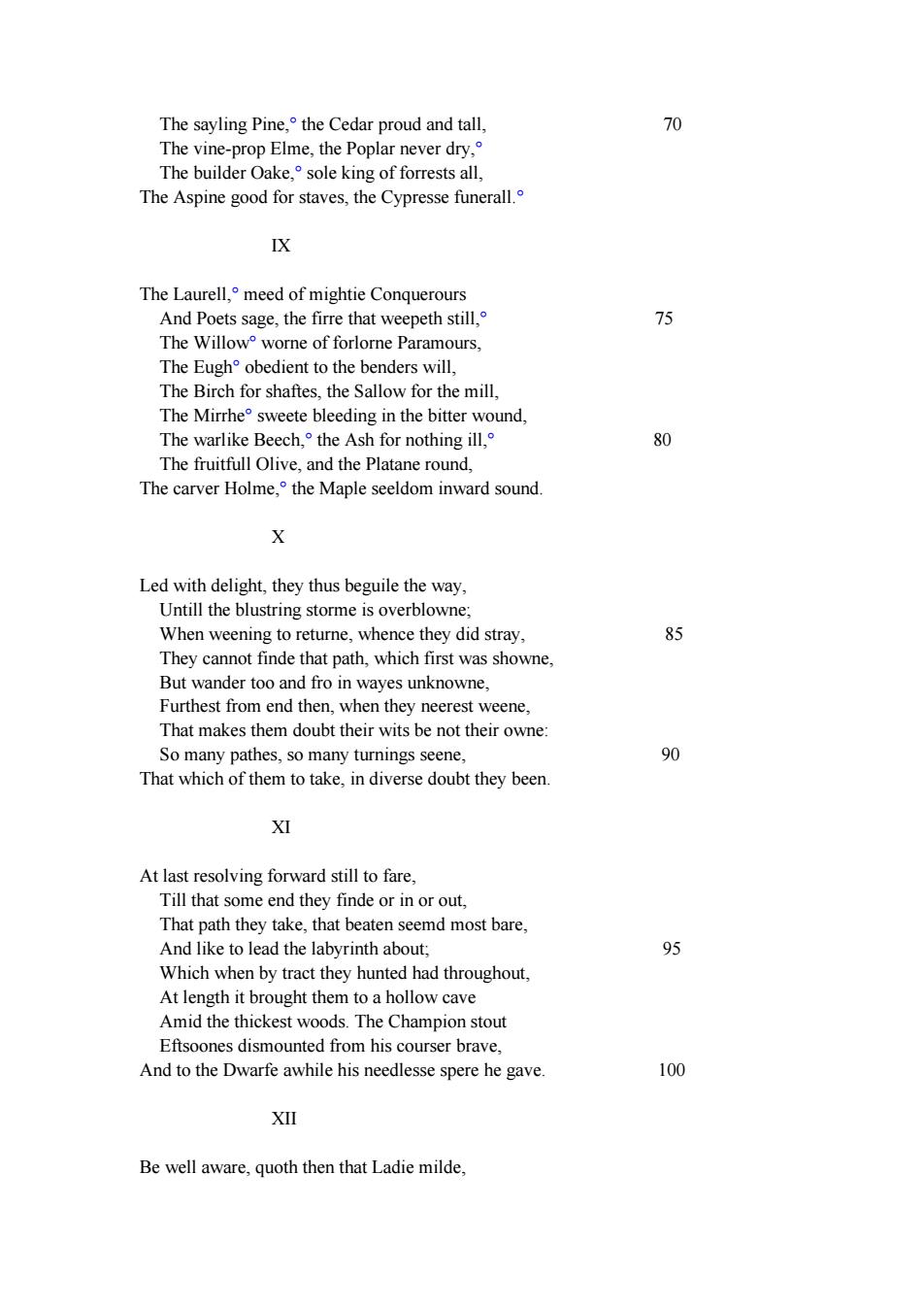
The sayling Pine,the Cedar proud and tall, 70 The vine-prop Elme,the Poplar never dry,o The builder Oake,sole king of forrests all, The Aspine good for staves,the Cypresse funerall. X The Laurell,meed of mightie Conquerours And Poets sage,the firre that weepeth still, 75 The Willow worne of forlorne Paramours, The Eugh obedient to the benders will, The Birch for shaftes,the Sallow for the mill, The Mirrhe sweete bleeding in the bitter wound, The warlike Beech,°the Ash for nothing ill,.° 80 The fruitfull Olive,and the Platane round, The carver Holme,the Maple seeldom inward sound. X Led with delight,they thus beguile the way, Untill the blustring storme is overblowne; When weening to returne,whence they did stray, 85 They cannot finde that path,which first was showne, But wander too and fro in wayes unknowne, Furthest from end then,when they neerest weene, That makes them doubt their wits be not their owne: So many pathes,so many turnings seene, 90 That which of them to take,in diverse doubt they been. XI At last resolving forward still to fare, Till that some end they finde or in or out, That path they take,that beaten seemd most bare, And like to lead the labyrinth about: 95 Which when by tract they hunted had throughout, At length it brought them to a hollow cave Amid the thickest woods.The Champion stout Eftsoones dismounted from his courser brave, And to the Dwarfe awhile his needlesse spere he gave. 100 XII Be well aware,quoth then that Ladie milde
The sayling Pine,° the Cedar proud and tall, 70 The vine-prop Elme, the Poplar never dry,° The builder Oake,° sole king of forrests all, The Aspine good for staves, the Cypresse funerall.° IX The Laurell,° meed of mightie Conquerours And Poets sage, the firre that weepeth still,° 75 The Willow° worne of forlorne Paramours, The Eugh° obedient to the benders will, The Birch for shaftes, the Sallow for the mill, The Mirrhe° sweete bleeding in the bitter wound, The warlike Beech,° the Ash for nothing ill,° 80 The fruitfull Olive, and the Platane round, The carver Holme,° the Maple seeldom inward sound. X Led with delight, they thus beguile the way, Untill the blustring storme is overblowne; When weening to returne, whence they did stray, 85 They cannot finde that path, which first was showne, But wander too and fro in wayes unknowne, Furthest from end then, when they neerest weene, That makes them doubt their wits be not their owne: So many pathes, so many turnings seene, 90 That which of them to take, in diverse doubt they been. XI At last resolving forward still to fare, Till that some end they finde or in or out, That path they take, that beaten seemd most bare, And like to lead the labyrinth about; 95 Which when by tract they hunted had throughout, At length it brought them to a hollow cave Amid the thickest woods. The Champion stout Eftsoones dismounted from his courser brave, And to the Dwarfe awhile his needlesse spere he gave. 100 XII Be well aware, quoth then that Ladie milde
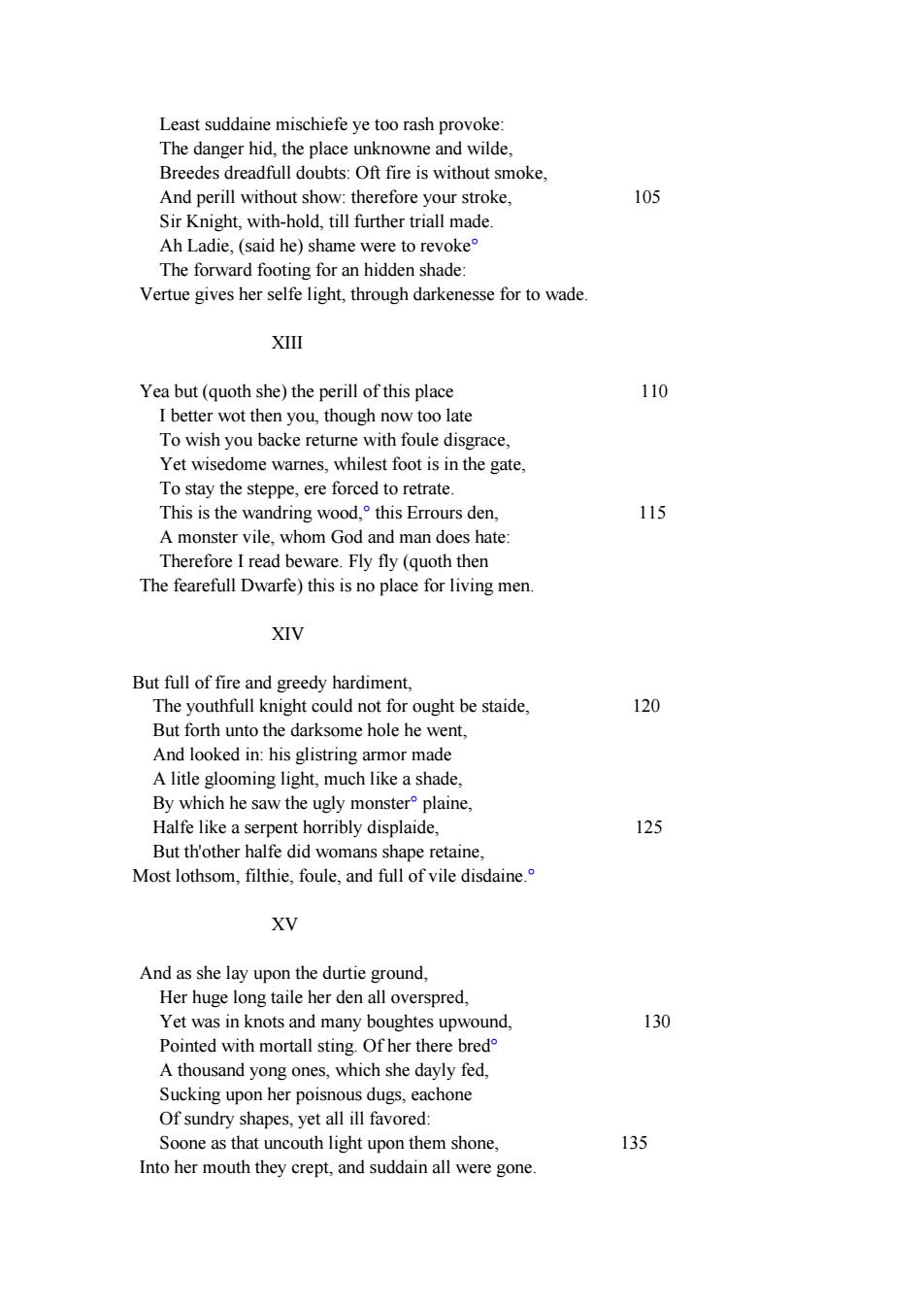
Least suddaine mischiefe ye too rash provoke: The danger hid,the place unknowne and wilde. Breedes dreadfull doubts:Oft fire is without smoke, And perill without show:therefore your stroke, 105 Sir Knight,with-hold,till further triall made. Ah Ladie,(said he)shame were to revoke The forward footing for an hidden shade: Vertue gives her selfe light,through darkenesse for to wade. XIlI Yea but(quoth she)the perill of this place 110 I better wot then you,though now too late To wish you backe returne with foule disgrace, Yet wisedome warnes,whilest foot is in the gate To stay the steppe,ere forced to retrate. This is the wandring wood,this Errours den, 115 A monster vile,whom God and man does hate Therefore I read beware.Fly fly(quoth then The fearefull Dwarfe)this is no place for living men. XIV But full of fire and greedy hardiment, The youthfull knight could not for ought be staide, 120 But forth unto the darksome hole he went, And looked in:his glistring armor made A litle glooming light,much like a shade, By which he saw the ugly monster plaine, Halfe like a serpent horribly displaide, 125 But th'other halfe did womans shape retaine, Most lothsom,filthie,foule,and full of vile disdaine. XV And as she lay upon the durtie ground, Her huge long taile her den all overspred, Yet was in knots and many boughtes upwound, 130 Pointed with mortall sting.Of her there bred A thousand yong ones,which she dayly fed, Sucking upon her poisnous dugs,eachone Of sundry shapes,yet all ill favored: Soone as that uncouth light upon them shone, 135 Into her mouth they crept,and suddain all were gone
Least suddaine mischiefe ye too rash provoke: The danger hid, the place unknowne and wilde, Breedes dreadfull doubts: Oft fire is without smoke, And perill without show: therefore your stroke, 105 Sir Knight, with-hold, till further triall made. Ah Ladie, (said he) shame were to revoke° The forward footing for an hidden shade: Vertue gives her selfe light, through darkenesse for to wade. XIII Yea but (quoth she) the perill of this place 110 I better wot then you, though now too late To wish you backe returne with foule disgrace, Yet wisedome warnes, whilest foot is in the gate, To stay the steppe, ere forced to retrate. This is the wandring wood,° this Errours den, 115 A monster vile, whom God and man does hate: Therefore I read beware. Fly fly (quoth then The fearefull Dwarfe) this is no place for living men. XIV But full of fire and greedy hardiment, The youthfull knight could not for ought be staide, 120 But forth unto the darksome hole he went, And looked in: his glistring armor made A litle glooming light, much like a shade, By which he saw the ugly monster° plaine, Halfe like a serpent horribly displaide, 125 But th'other halfe did womans shape retaine, Most lothsom, filthie, foule, and full of vile disdaine.° XV And as she lay upon the durtie ground, Her huge long taile her den all overspred, Yet was in knots and many boughtes upwound, 130 Pointed with mortall sting. Of her there bred° A thousand yong ones, which she dayly fed, Sucking upon her poisnous dugs, eachone Of sundry shapes, yet all ill favored: Soone as that uncouth light upon them shone, 135 Into her mouth they crept, and suddain all were gone